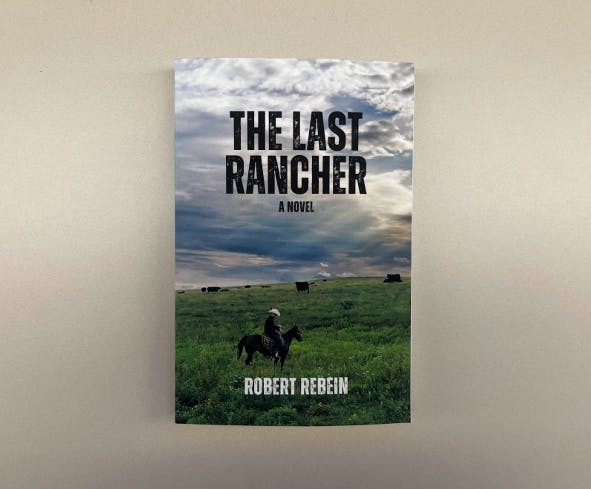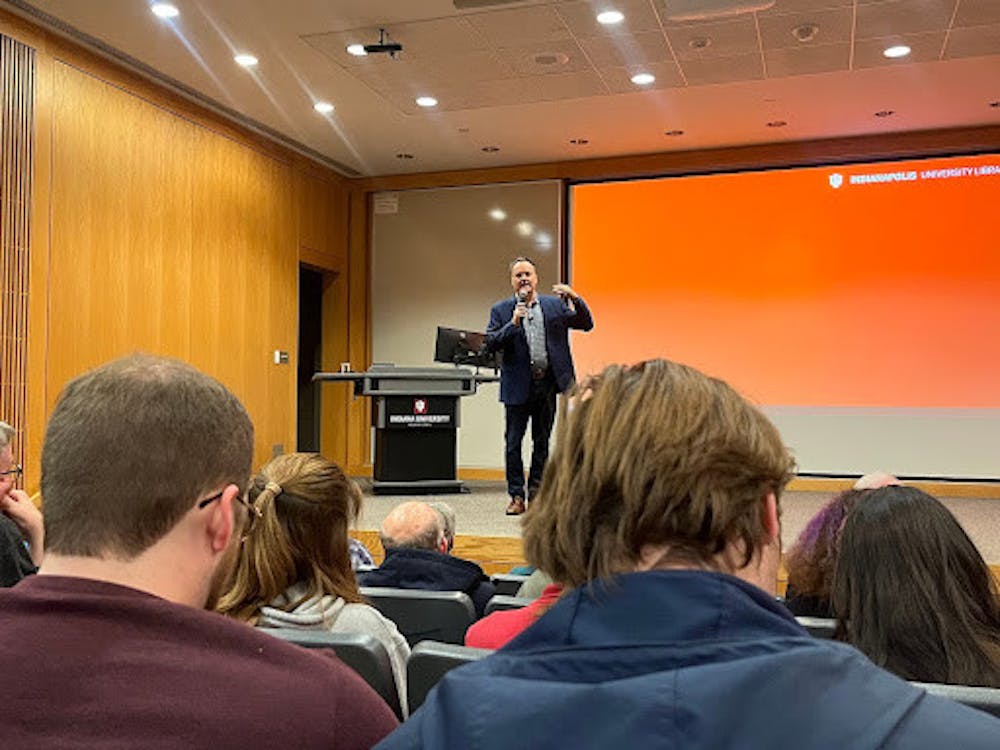As part of the Rufus & Louise Reading Series, a showcase of active authors visiting campus to share their works, Professor Robert Rebein hosted a comical yet intriguing reading of his recently published book, “The Last Rancher,” on Nov. 7.
The Rufus & Louise Reading Series was founded in 1997 in honor of former English Department chair Rufus Reiberg and his wife, Louise. To further develop the creative writing program at Indiana University Indianapolis, the Reiberg family established the series to bring living authors to campus, offering students exposure to the process of publishing. Terry Kirts, senior lecturer in creative writing and director of the series, has been organizing these events on behalf of the Reiberg family and the university since 2006.
“The hallmark of any great creative writing program is that you also bring in living writers to read their work and talk with students to give them that exposure,” Kirts said. “And so the Reiberg family wanted to honor their father, and later their mother, by donating money to bring writers in and give people—not just students—the opportunity to attend.”
After obtaining his Master of Fine Arts in Fiction Writing from Washington University and a doctorate in American Literature at the State University of New York at Buffalo, Rebein began working within the English department at IUI. His academic interests include creative writing, contemporary American fiction, and twentieth-century American literature. Currently, Rebein teaches various writing classes to students from undergraduate to graduate level. He published his first book “Hicks, Tribes & Dirty Realists” in 2001, and since then has had a few titles under his name.
“The Last Rancher,” Rebein's most recent book, was published on Feb. 29. The novel revolves around a family from southwest Kansas. Though they had previously wanted nothing to do with it, after a near-fatal accident befalls their father, the children pause their lives and return to save the ranch, unpacking family drama that changes their lives. The story is similar to Rebein’s own life, as he was born and raised on a ranch in Dodge City, Kansas, and later left to pursue his own dreams.

“What draws me most to this novel is the power of the land to define families and influence the arc of characters' lives in so many different and interesting ways,” said Kirts when introducing Rebein to the crowd. “Challenging the old adage that you can’t go home, Rob orchestrates a cinematic family drama that allows different characters at various removals from ranch life in Kansas to come home.”
Rebein offered insight into the writing process behind “The Last Rancher,” a novel that began in 2000, making it a 24-year process. He explained that, rather than continuously writing over the years, he created multiple drafts of sections, often setting the book aside to work on his two other published novels.
“So if you add it all up, I’ve got about six or seven years of work in this book,” Rebein said. “And I just got to tell you, it was so much fun.”
After Rebein read excerpts from the book, the audience had the opportunity to ask questions. One member asked Rebein about the fate of a character, and Rebein admitted he didn’t know, as he hadn’t written it. He shared that many readers asked him similar questions that he hadn’t anticipated.
“Everyone was like, ‘So when’s the sequel coming out?’ In other words, they wanted the story to keep going, to find out what happened to these people. And what’s interesting to me is that it never occurred to me,” Rebein said, recalling his book tour. “I was like, ‘What are you talking about? The story is over.’ But there was this sense that they didn’t want to leave the characters, or maybe that I had left some cliffhangers in there or something. I felt like it was the most clean, closed-end I could get.”
Rebein said the most extensive research focused on accurately representing the landscape of his hometown, where the story takes place.
“So that did require me to print out the entire novel, highlight every single part of the novel where something was happening in Dodge City, and drive around in my truck for days after days, stopping to see that I was getting those things right,” Rebein said. “So, in a weird way, the most research I did was at the place I know more about than any other place in the world. But, to really make it accurately set there, I had to do it. And, man, am I glad that I did.”
Rebein also reflected on his early exposure to literature, crediting his mother, who was a passionate reader.
“My mother was a big reader. She read everything. And so I kinda had a library in my home to pick through, and she was very good about it,” Rebein said. “I would take one of those stupid, like, fold-your-library leather-bound things with gilt pages, and I would take it with me to the ranch and farm and come back with dirt stains and greasy finger marks all over. And she just loved it.”
Several attendees shared their thoughts on the reading. Bella Park, a sophomore studying creative writing, said she attended the event to become more involved with the literary community. As someone from rural Michigan, she connected with the themes of “The Last Rancher,” especially the way the novel’s characters balance rural life after leaving for the pursuit of higher education, a theme she shares with her own family. Park took Rebein’s advice to heart.
“His reading was passionate but also kinda leveling with you, that no one can teach you how to write a book, you just have to do it,” Park said. “I’m like, this is one of my first real fiction readings, and the fact that I felt like he could connect on a level with people who are aspiring to be writers and understanding the audience—it was just kinda comforting. He was like, ‘This is just a part of the deal.’”
Signe Nettum, a second-year graduate student, attended the reading after hearing about it from a coworker who had once been Rebein’s student.
“It was just very interesting getting an insight into a professor who’s published fiction. I mean, those are both my goals. I want to be a published author, and I want to be a professor,” Nettum said. “So I was like, ‘I’ll look at someone who has achieved what I want to achieve.’”
Emma Oder, an undergraduate student, was prompted by her creative writing class to attend the event. She attended in hopes of learning more about characterization, a struggle she noticed in her own writing.
“I really liked how, in the prologue, they did a little character analysis on how you view the brand and what that says about the character,” Oder said. “I was like, ‘That’s really interesting. I would’ve never thought about doing that.’”
Rebein has been supporting and attending the Reiberg Series for 24 years, but this was his first time hosting a reading event. He believes that events like these help support the liberal arts in many different ways.
“For one, it brings together what I sorta call the tribe of readers—people who love reading and writing. It brings them together in one place,” he said. “For the students on campus, it gives them an opportunity to see someone who’s doing something they want to do, and then be able to talk to that person and, of course, take classes from them.”
To him, events like these offer another valuable learning experience for students who want to get involved on campus.
“It’s important that students are given cultural events to widen their learning and engage in learning outside the classroom,” Rebein said. “But, I think it’s also important to bring the community onto campus and show them what we’re doing here and what it’s like. An event like this tries to bring faculty, students and community members together around this literary idea.”
The Reiberg Series events are held once a semester and feature various faculty members, students, and community members who have published work. Each event is free and open to the public. For readers and aspiring authors, the Reiberg Series provides an opportunity to find book recommendations and gain insight into getting started as a writer. For those interested in attending any future events, announcements on dates and authors will be released in the Spring semester through the English department.
Melanie Contreras is a freshman at IUI double majoring in English and journalism with a minor in legal studies. Outside of writing she enjoys learning languages and going for walks.





